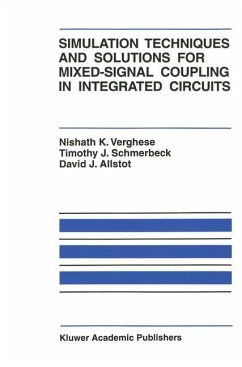
FLOATING-GATE TRANSISTORS IN ANALOG AND MIXED-SIGNAL CIRCUIT DESIGN
Programming, Design Methodology, and Applications
Versandkostenfrei!
Versandfertig in 6-10 Tagen
39,99 €
inkl. MwSt.

PAYBACK Punkte
20 °P sammeln!
This book is a rich and excellent resource fordesigners, who are challenged with analog andmixed-signal VLSI design issues due to the increaseddownscaling trend in the CMOS technology. Eventhough such a trend empowers the designers to achievehigh element densities for VLSI circuits, it alsorequires less power consumption for low-powerreconfigurable systems and imposes substantial designchallenges for analog and mixed-signal circuits. Traditional approaches such as calibration, trimming,and layout techniques are not cost-effective.Furthermore, employing such techniques to improvelinearity, and ...
This book is a rich and excellent resource for
designers, who are challenged with analog and
mixed-signal VLSI design issues due to the increased
downscaling trend in the CMOS technology. Even
though such a trend empowers the designers to achieve
high element densities for VLSI circuits, it also
requires less power consumption for low-power
reconfigurable systems and imposes substantial design
challenges for analog and mixed-signal circuits.
Traditional approaches such as calibration, trimming,
and layout techniques are not cost-effective.
Furthermore, employing such techniques to improve
linearity, and circumvent noise and distortion issues
in the analog domain proves to be a daunting task due
to the lower supply voltage and increased parametric
variations as a result of downscaling in the CMOS
technology.
This book provides a fresh and experimentally
verified design strategy based on floating-gate
transistors to cope with existing challenges and
provide tunability and reconfigurability for analog
and mixed-signal circuits. It will be useful to
practicing engineers, academic researchers, and
graduate students, who are interested in analog and
mixed-signal VLSI circuit design.
designers, who are challenged with analog and
mixed-signal VLSI design issues due to the increased
downscaling trend in the CMOS technology. Even
though such a trend empowers the designers to achieve
high element densities for VLSI circuits, it also
requires less power consumption for low-power
reconfigurable systems and imposes substantial design
challenges for analog and mixed-signal circuits.
Traditional approaches such as calibration, trimming,
and layout techniques are not cost-effective.
Furthermore, employing such techniques to improve
linearity, and circumvent noise and distortion issues
in the analog domain proves to be a daunting task due
to the lower supply voltage and increased parametric
variations as a result of downscaling in the CMOS
technology.
This book provides a fresh and experimentally
verified design strategy based on floating-gate
transistors to cope with existing challenges and
provide tunability and reconfigurability for analog
and mixed-signal circuits. It will be useful to
practicing engineers, academic researchers, and
graduate students, who are interested in analog and
mixed-signal VLSI circuit design.












